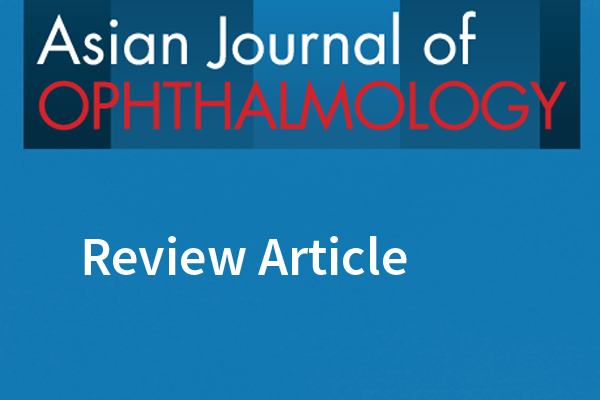Changes in practice guidelines and regulations in ophthalmology due to COVID-19
Abstract
Purpose: Coronavirus disease 2019 (COVID-19) is caused by the severe acute respiratory syndrome coronavirus 2 (SARS-CoV-2) and has been declared as a pandemic by the World Health Organization (WHO). The purpose of the study was to summarize the current recommendations and practice guidelines to be implemented in ophthalmology due to COVID-19.
Study design: A systematic review of literature.
Methods: A systematic literature search was performed using MEDLINE, EMBASE, CINAHL, Clinical Trials.gov, and ProQuest Dissertations and Theses until May 25, 2020. All conferences held through Association for Research in Vision and Ophthalmology, American Academy of Ophthalmology, and Canadian Society of Ophthalmology were also searched until May 25, 2020. Eligible articles were identified by reviewing the retrieved results.
Results: In total, 57 records were retrieved from multiple databases and 0 records were identified through grey literature search. Ten articles were included for analysis. Rigorous hand hygiene, proper screening, and proper use of protective personal equipment by both staff and patients were strongly advised. Careful triage of patients upon arrival to facilities based on screening was advised along with deferral of any non-urgent appointments and implementing measures to limit exposure in waiting rooms. Routine disinfection of equipment, use of shields or barriers on slit lamps, and limiting the use of instruments and tests were strongly recommended and advised.
Conclusions: The implementation of guidelines should be in place for ophthalmologic staff, facilities, and visitors to help minimize the spread of COVID-19 and promote a safer environment in ophthalmology.
References
Lam DSC, Wong RLM, Lai KHW, et al. COVID-19: Special Precautions in Ophthalmic Practice and FAQs on Personal Protection and Mask Selection. Asia Pac J Ophthalmol (Phila). 2020;9(2):67–77. https://doi.org/10.1097/APO.0000000000000280
Chen N, Zhou M, Dong X, et al. Epidemiological and clinical characteristics of 99 cases of 2019 novel coronavirus pneumonia in Wuhan, China: a descriptive study. Lancet. 2020;395:507–513. https://doi.org/10.1016/S0140-6736(20)30211-7
Alyward B, Liang W. Report of the WHO-China Joint Mission on Coronavirus Disease 2019 (COVID-19)World Health Organization. WHO; 2020. Available from: https://www.who.int/publications-detail/report-of-the-who-china-joint-mission-on-coronavirus-disease-2019-(covid-19)
Li Q, Guan X, Wu P, et al. Early transmission dynamics in Wuhan, China, of novel coronavirus-infected pneumonia. N. Engl. J. Med. 2020;382:1199–1207. https://doi.org/10.1056/NEJMoa2001316
Green A. Li Wenliang. Lancet. 2020;395(10225):682. https://doi.org/10.1016/s0140-6736(20)30382-2
Moher D, Liberati A, Tetzlaff J, Altman DG. Preferred reporting items for systematic reviews and meta-analyses: the PRISMA statement. J Clin Epidemiol. 2009;62(10): P1006–1012. https://doi.org/10.1016/j.jclinepi.2009.06.005
Shea BJ, Reeves BC, Wells G, et al. AMSTAR 2: a critical appraisal tool for systematic reviews that include randomised or non-randomised studies of healthcare interventions, or both. BMJ. 2017;358:j4008. https://doi.org/10.1136/bmj.j4008
Liebmann J. Ophthalmology and Glaucoma Practice in the COVID-19 Era. J. Glaucoma. 2020;29(6): 404–408. https://doi.org/10.1097/IJG.0000000000001519
Korobelnik JF, Loewenstein A, Eldem B, et al. Guidance for anti-VEGF intravitreal injections during the COVID-19 pandemic. Graefes Arch. Clin. Exp. Ophthalmol. 2020;258:1149–1156. https://doi.org/10.1007/s00417-020-04703-x
Mishra KK, Afshar A, Thariat J, et al. Practice considerations for proton beam radiation therapy of uveal melanoma during the coronavirus disease pandemic: particle therapy co-operative group ocular experience. Adv Radiat Oncol. 2020;5(4):682-686. https://doi.org/10.1016/j.adro.2020.04.010
Lim LW, Yip LW, Tay HW, et al. Sustainable practice of ophthalmology during COVID-19: challenges and solutions. Graefes Arch Clin. Exp Ophthalmol. 2020;258:1427–1436. https://doi.org/10.1007/s00417-020-04682-z
Romano MR, Montericcio A, Montalbano C, et al. Facing COVID-19 in Ophthalmology Department. Curr Eye Res. 2020;45:1–6. https://doi.org/10.1080/02713683.2020.1752737
Seah I, Su X, Lingam G. Revisiting the dangers of the coronavirus in the ophthalmology practice. Eye. 2020;34:1155–1157. https://doi.org/10.1038/s41433-020-0790-7
Sengupta S, Honavar S, Sachdev M, et al. All India ophthalmological society – Indian journal of ophthalmology consensus statement on preferred practices during the COVID-19 pandemic. Indian J Ophthalmol. 2020;68:711. https://doi.org/10.4103/ijo.IJO_871_20
Bacherini D, Biagini I, Lenzetti C, Virgili G, Rizzo S, Giansanti F. The COVID-19 pandemic from an ophthalmologist’s perspective. Trends Mol Med. 2020;26:529–531. https://doi.org/10.1016/j.molmed.2020.03.008
Lai THT, Tang EWH, Chau SKY, Fung KSC, Li KKW. Stepping up infection control measures in ophthalmology during the novel coronavirus outbreak: an experience from Hong Kong. Graefes Arch Clin Exp. Ophthalmol. 2020;258:1049–1055. https://doi.org/10.1007/s00417-020-04641-8
Safadi K, Kruger JM, Chowers I, et al. Ophthalmology practice during the COVID-19 pandemic. BMJ Open. 2020;5:e000487. https://doi.org/10.1136/bmjophth-2020-000487
Williams AM, Kalra G, Commiskey PW, et al. Ophthalmology practice during the coronavirus disease 2019 pandemic: the university of Pittsburgh experience in promoting clinic safety and embracing video visits. Ophthalmol Ther. 2020. https://doi.org/10.1007/s40123-020-00255-9
Li JPO, Shantha J, Wong TY, et al. Preparedness among ophthalmologists: during and beyond the COVID-19 pandemic. Ophthalmology. 2020;127:569–572. https://doi.org/10.1016/j.ophtha.2020.03.037
Moravvej Z, Soltani Moghadam R, Ahmadian Yazdi A, Shahraki K. COVID-19 pandemic: ophthalmic practice and precautions in a tertiary eye hospital in Iran. Infect Control Hosp Epidemiol. 2020:1–6. https://doi.org/10.1017/ice.2020.164
Yu AY, Tu R, Shao X, Pan A, Zhou K, Huang J. A comprehensive Chinese experience against SARS-CoV-2 in ophthalmology. Eye Vis (Lond). 2020;7:1–9. https://doi.org/10.1186/s40662-020-00187-2
Ma X, Lin J, Fang S. Precautions in ophthalmic practice in a hospital with the risk of COVID-19: experience from China. Acta Ophthalmol. 2020:52052–1. https://doi.org/10.1111/aos.14436

Copyright (c) 2021 Brian Edward Yu, Bahaaldin Helal, Monali Malvankar-Mehta

This work is licensed under a Creative Commons Attribution 4.0 International License.
Authors who publish with this journal agree to the following terms:
- Authors retain copyright and grant the journal right of first publication, with the work twelve (12) months after publication simultaneously licensed under a Creative Commons Attribution License that allows others to share the work with an acknowledgement of the work's authorship and initial publication in this journal.
- Authors are able to enter into separate, additional contractual arrangements for the non-exclusive distribution of the journal's published version of the work (e.g., post it to an institutional repository or publish it in a book), with an acknowledgement of its initial publication in this journal.
- Authors are permitted and encouraged to post their work online (e.g., in institutional repositories or on their website) prior to and during the submission process, as it can lead to productive exchanges, as well as earlier and greater citation of published work (See The Effect of Open Access).


